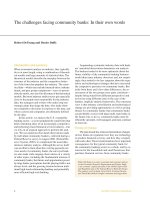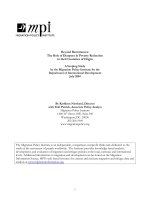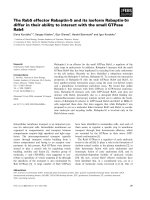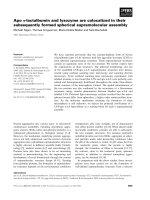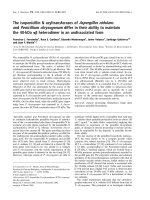string waking in their footseps
Bạn đang xem bản rút gọn của tài liệu. Xem và tải ngay bản đầy đủ của tài liệu tại đây (2.05 MB, 205 trang )
ST IN G AND THE POL IC E
Tempo: A Rowman & Littlefield Music Series on Rock, Pop, and Culture
Series Editor: Scott Calhoun
Tempo: A Rowman & Littlefield Music Series on Rock, Pop, and Culture offers titles
that explore rock and popular music through the lens of social and cultural history,
revealing the dynamic relationship between musicians, music, and their milieu. Like
other major art forms, rock and pop music comment on their cultural, political, and
even economic situation, reflecting the technological advances, psychological concerns,
religious feelings, and artistic trends of their times. Contributions to the Tempo series
are the ideal introduction to major pop and rock artists and genres.
Titles in the Series
Bob Dylan: American Troubadour, by Donald Brown
Bon Jovi: America’s Ultimate Band, by Margaret Olson
British Invasion: The Crosscurrents of Musical Influence, by Simon Philo
Bruce Springsteen: American Poet and Prophet, by Donald L. Deardorff II
The Clash: The Only Band That Mattered, by Sean Egan
Kris Kristofferson: Country Highwayman, by Mary G. Hurd
Patti Smith: America’s Punk Rock Rhapsodist, by Eric Wendell
Paul Simon: An American Tune, by Cornel Bonca
Ska: The Rhythm of Liberation, by Heather Augustyn
Sting and The Police, by Aaron J. West
ST IN G AND THE POL IC E
Walking in Their Footsteps
Aaron J. West
ROWMAN & LITTLEFIELD
Lanham • Boulder • New York • London
Published by Rowman & Littlefield
A wholly owned subsidiary of The Rowman & Littlefield Publishing Group,
Inc.
4501 Forbes Boulevard, Suite 200, Lanham, Maryland 20706
www.rowman.com
Unit A, Whitacre Mews, 26-34 Stannary Street, London SE11 4AB
Copyright © 2015 by Aaron J. West
All rights reserved. No part of this book may be reproduced in any form or by
any electronic or mechanical means, including information storage and retrieval systems, without written permission from the publisher, except by a reviewer
who may quote passages in a review.
British Library Cataloguing in Publication Information Available
Library of Congress Cataloging-in-Publication Data
West, Aaron J.
Sting and The Police : walking in their footsteps / Aaron J. West.
pages cm. — (Tempo : a Rowman & Littlefield music series on rock, pop, and culture)
Includes bibliographical references and index.
ISBN 978-0-8108-8490-8 (hardback : alk. paper) — ISBN 978-0-8108-8491-5 (ebook) 1. Police
(Musical group) 2. Sting (Musician) 3. Rock music—1981-1990—History and criticism. I. Title.
ML421.P67W47 2015
782.42166092'2—dc23
2015015451
TM
The paper used in this publication meets the minimum requirements of
American National Standard for Information Sciences Permanence of Paper
for Printed Library Materials, ANSI/NISO Z39.48-1992.
Printed in the United States of America
CONTENTS
Foreword
Scott Calhoun, Series Editor
vii
Timeline
ix
Acknowledgments
xxxiii
Introduction
xxxv
1 The Police and the Progressive Rock, Punk, and Reggae Styles
1
2 The Police and the Style Mosaic
21
3 Sting and the Album Mosaic
37
4 Selling The Police and Sting to the World
57
5 Sting in the Age of Global Activism
81
6 The Police and the Rock Trio
103
7 The Music after The Police
125
Further Reading
141
Further Listening
145
Index
153
About the Author
163
v
FOREWORD
Scott Calhoun, Series Editor
The following exploration of Sting and The Police as artists—as jazz-,
funk-, reggae-, and folk-pop artists, specifically—gets it right about how
a three-piece combo can turn alchemic. Stewart Copeland, Andy Summers, and Gordon Matthew Sumner, or Sting, brought their musical
curiosities and complex personalities together to form a new wave of
astute, infectious English song craft, while giving audiences years of
thrilling performances. Aaron J. West gets it right too, about the chemistry of a complicated musical artist who trends toward the restless,
virtuosic type, as is true of Sting. Seeming to enjoy the chase of craft as
much as the adulation of the crowd, The Police’s potency came from
skillful compounding of musical styles already marked by strong
grooves, inventive tempos, and playfulness. The music The Police
made, and that Sting continues to make, has satisfied the literate and
literary, as well the mainstream appetite for something eminently fun to
sing and dance to. But Sting’s thirst for a greater, more singular pursuit
of craft and crowd sent him on many more cultural quests after The
Police, looking for the pop hooks, world beats, activist heroics, and even
stage roles offered by film and theater, to satiate the artist.
Sometimes accused of appropriation by critics who lean toward purists, The Police’s music has nevertheless endured. It has inspired many
post-1980s artists who had the good fortune of composing their songs in
times when borrowing, referencing, and sampling was de rigueur. At
times accused of affectation, Sting, never the shy nor demure performer, has turned any such complaints to his advantage, commanding our
vii
viii
FOREW ORD
attention when on a new project by promising to tip the balance from
showmanship toward sophistication. This study presents Sting and The
Police by choosing a different path of presentation. Pop legends they
are, with storied lives and plenty of laurels to show for it. But West’s
perspective is drawn to seeing their rise to acclaim and influence in
popular music history as the acts of artists choosing their colors, their
brush strokes, and their canvases, intentionally assembling the pieces to
make something brilliantly new.
TIMELINE
World and Cultural Events
Sting, Andy Summers, and
Stewart Copeland’s Lives and
Careers
December 1942: In the midst of December 1942: Andrew James
World War II, over sixty U-boats Summers is born December 31 at
are sunk.
the edge of the river Wyre in
Lancashire (Poulton-le-Fylde),
near Blackpool, England.
January 1945: The Soviet Red
Army liberates the Birkenau and
Auschwitz concentration camps.
August 1945: The United States
bombs Hiroshima and Nagasaki
with atomic weapons. World War
II ends soon after.
July 1946: U.S. nuclear testing
begins at Bikini Atoll in
Micronesia. Sting protests these
kinds of experiments with “La
Belle Dame Sans Regrets” in
1996.
February 1947: Voice of
America begins transmitting into
ix
x
World and Cultural Events
TIMELINE
Sting, Andy Summers, and
Stewart Copeland’s Lives and
Careers
the Soviet Union and its satellites.
These broadcasts will influence
generations of Eastern European
and Russian musicians.
March 1948: Arturo Toscanini,
during his television debut,
conducts the NBC Symphony,
performing the works of Richard
Wagner.
April 1950: The Group Areas
Acts passes in South Africa,
formally segregating the races. By
the 1980s, performers will play a
number of anti-apartheid shows.
October 1951: I Love Lucy
debuts on CBS, and Winston
Churchill is re-elected prime
minister of the United Kingdom.
October 1951: Gordon Matthew
Thomas Sumner (Sting) is born in
Wallsend, Tyneside, Tyne and
Wear, England. His childhood in
Wallsend will be the inspiration
for multiple songs and even a
Broadway show.
July 1952: Mickey Mantle hits his July 1952: Stewart Armstrong
first grand slam.
Copeland is born in Alexandria,
Virginia, on July 16.
April 1953: Frank Sinatra and
Nelson Riddle begin their iconic
recordings for Capitol Records.
1953: The young Andy Summers
is listening to AFN radio, which
plays American jazz.
May 1954: Brown v. Board of
Education of Topeka bans racial
segregation in U.S. public schools.
September 1955: Gunsmoke,
television’s longest-running
1955: Andy Summers is given his
first guitar by his uncle Jim. A
T I M E LI N E
World and Cultural Events
xi
Sting, Andy Summers, and
Stewart Copeland’s Lives and
Careers
western, debuts on CBS. Sting will lodger named David Ellis helps
cite this as one of his favorite
him tune it.
programs as a child.
February 1956: Elvis Presley has November 1956: As Queen
his first hit with “Heartbreak
Elizabeth II rides by, Sting greets
Hotel.”
her by waving a Union Jack. She
waves back.
January 1957: The Cavern Club
opens in Liverpool; it will become
an early performance venue for
The Beatles.
August 1957: American
Bandstand premiers.
October 1957: The Soviet Union October 1957: Summers buys a
launches Sputnik 1 into orbit.
Gibson ES-175 in London.
1958: Summers buys a Gibson
ES-335. Eventually, there will be
an Andy Summers signature
model of this guitar.
July 1958: The U.S. Marines land
in Beirut, Lebanon, to protect the
existing pro-Western government.
The Copeland family will leave for
London soon after.
April 1960: Ben-Hur wins a
number of Academy Awards,
including Best Picture. Stewart
Copeland will premiere a liveperformance score for an earlier
film version of Ben-Hur in 2014.
August 1961: Construction of the
Berlin Wall begins.
xi i
World and Cultural Events
TIMELINE
Sting, Andy Summers, and
Stewart Copeland’s Lives and
Careers
August 1962: President Kennedy
orders a blockade of Cuba in
order to prevent the establishment
of Soviet missile bases.
1964: Andy Summers joins Zoot
Money’s Big Roll Band.
December 1965: Sting attends
The Beatles’ arrival at Newcastle
City Hall.
March 1967: Sting attends a
concert by The Jimi Hendrix
Experience at Club A’ Go Go in
Newcastle.
July 1967: Summers, along with
musicians from Zoot Money’s Big
Roll Band, creates Dantalian’s
Chariot, a contemporary
psychedelic band.
August 1967: Brian Epstein,
manager for The Beatles, dies.
August 1967: Copeland attends a
concert by The Jimi Hendrix
Experience at the Saville Theatre
in London.
May 1968: Summers joins the
early progressive rock group, Soft
Machine.
July 1968: Summers is dismissed
from Soft Machine.
August 1968: Summers travels to
California and joins Eric Burdon
and The Animals.
T I M E LI N E
World and Cultural Events
xiii
Sting, Andy Summers, and
Stewart Copeland’s Lives and
Careers
October 1968: Summers jams
with Jimi Hendrix at TTG Studios
in Hollywood, California.
January 1969: The first Led
Zeppelin album is released; The
Beatles give their last public
performance.
July 1969: Neil Armstrong
becomes first man to walk on the
moon.
August 1969: Woodstock Music
Festival takes place.
December 1969: Tragic Rolling
Stones’ show at Altamont Raceway
takes place.
April 1970: The first Earth Day is
celebrated in the United States. In
the following decade, Sting will
become an advocate for
environmentalism.
September 1970: Jimi Hendrix
dies in London of drug-related
complications.
March 1971: Paul Simon’s
“Bridge over Troubled Water”
wins a Grammy Award for Song of
the Year. Sting will tour with
Simon forty-three years later.
March 1972: Northern Ireland is 1972: Along with keyboardist
occupied by Britain. The resulting Gerry Richardson, Sting joins
unrest will inspire “Invisible Sun.” Earthrise.
xi v
World and Cultural Events
TIMELINE
Sting, Andy Summers, and
Stewart Copeland’s Lives and
Careers
November 1972: Atari
introduces the arcade version of
Pong, the first video game.
Stewart Copeland will write the
music for the video game Spyro
the Dragon in 1998.
January 1973: A ceasefire is
signed in Vietnam. Ian Copeland,
Stewart Copeland’s brother, had
fought in the war.
1973: Sting joins the Phoenix
Jazzmen, a traditional jazz group
from which he earns his
nickname.
February 1973: The Harder
They Come, starring Jimmy Cliff,
increases the visibility of reggae in
the United States.
May 1973: Stewart Copeland is
the tour manager for Joan
Armatrading’s UK tour.
November 1973: Andy Summers
returns to London.
May 1974: India becomes the
world’s sixth nuclear power. The
Police will perform in India
during their 1980 world tour.
1974: Summers begins touring
with actor and singer David Essex,
Neil Sedaka, and Kevin Coyne.
August 1974: President Richard
Nixon resigns.
October 1974: Last Exit begins
rehearsing.
December 1974: Copeland
becomes the tour manager, and
later drummer, for the progressive
rock band, Curved Air.
T I M E LI N E
World and Cultural Events
xv
Sting, Andy Summers, and
Stewart Copeland’s Lives and
Careers
October 1975: Saturday Night
Live premieres with George
Carlin as host. Sting will perform
on SNL multiple times.
November 1976: Jimmy Carter
is elected president of the United
States.
1976: Curved Air records
Airbourne with Stewart Copeland.
Summers begins performing with
Kevin Ayers.
December 1976: Copeland
meets Sting after a Curved Air
concert and gives him his phone
number.
January 1977: Sting moves to
London with his wife and child.
By mid-January, Sting, Copeland,
and Henry Padovani are
rehearsing.
April 1977: The legendary disco
club, Studio 54, opens in New
York City.
May 1977: Andy Summers
performs with Copeland and Sting
in Strontium 90. Also, The Police,
with Henry Padovani, release the
single “Fall Out/Nothing
Achieving.”
July 1977: Andy Summers
performs with The Police for the
first time.
August 1977: Elvis Presley dies
at Graceland.
xv i
World and Cultural Events
TIMELINE
Sting, Andy Summers, and
Stewart Copeland’s Lives and
Careers
September 1977: South African
activist Steve Biko dies in police
custody.
October 1977: Never Mind the
Bollocks, Here’s the Sex Pistols is
released on A&M Records. This
company will also release all of
The Police albums.
February 1978: The Police
bleach their hair for a Wrigley’s
Spearmint chewing gum
commercial. Their blonde hair will
be a definitive part of their image.
October 1978: The Police begin
their first U.S. tour.
November 1978: Outlandos
d’Amour is released on A&M
Records.
March 1979: The nuclear power
plant at Three Mile Island,
Pennsylvania, has an accidental
release of radiation.
March 1979: The Police begin
their second U.S. tour.
May 1979: Conservative
politician Margaret Thatcher
becomes new prime minister. Her
conservative policies will draw the
ire of many British performers,
including Sting.
October 1979: Reggatta de Blanc
is released.
December 1979: The Soviet
Union invades Afghanistan.
T I M E LI N E
xvii
World and Cultural Events
Sting, Andy Summers, and
Stewart Copeland’s Lives and
Careers
April 1980: A helicopter and a
cargo plane collide in a disastrous
attempt to rescue American
hostages in Tehran.
1980: The Police are filmed
during a world tour, which will
result in The Police: Around the
World.
October 1980: Zenyatta
Mondatta is released.
November 1980: Ronald Reagan
is elected president of the United
States.
December 1980: John Lennon is
shot in New York City.
August 1981: MTV premieres
with the Buggles’ “Video Killed
the Radio Star.”
September 1981: Sting performs
at the Theatre Royal for Amnesty
International. Sting sings
“Roxanne,” “Message in a Bottle,”
and leads a performance of “I
Shall Be Released” as a closing
number. This is Sting’s
introduction to Amnesty
International.
October 1981: Ghost in the
Machine is released. It hits No. 2
in the United States.
1982: Stewart Copeland begins
recording the soundtrack to
Rumble Fish. His work will be
nominated for a Golden Globe
Award.
xv i i i
World and Cultural Events
TIMELINE
Sting, Andy Summers, and
Stewart Copeland’s Lives and
Careers
October 1982: Andy Summers/
Robert Fripp’s I Advance Masked
is released.
November 1982: Michael
Jackson’s Thriller debuts.
March 1983: The first compact
discs are sold in North America
and Europe.
1983: Summers publishes a
photography book titled Throb.
June 1983: Famine in Ethiopia
begins reaching epic proportions.
June 1983: Synchronicity is
released. It will be The Police’s
best-selling album and one of the
most iconic albums of the 1980s.
August 1983: The Police perform
at Shea Stadium, and Sting
proclaims, “This is it.”
October 1983: The United States
invades Grenada.
March 1984: The Police
complete their final world tour in
Melbourne, Australia (until their
reunion).
May 1984: The Soviet Union
withdraws from the Olympic
Games.
September 1984: Andy
Summers/Robert Fripp’s
Bewitched is released.
November 1984: Bob Geldof’s
Band Aid releases “Do They
Know It’s Christmas?” in an
attempt to aid starving Ethiopians.
Sting participates in the recording.
T I M E LI N E
World and Cultural Events
xix
Sting, Andy Summers, and
Stewart Copeland’s Lives and
Careers
March 1985: USA for Africa
debuts “We Are the World.”
May 1985: Filming begins for
Bring on the Night, a
documentary promoting Sting’s
new solo career.
June 1985: Sting’s first solo
album, The Dream of the Blue
Turtles, is released.
July 1985: Sting performs at Live
Aid. He performs with only
Branford Marsalis on saxophone.
October 1985: Terrorists hijack
the Achille Lauro, an Italian cruise
liner.
November 1985: Every Breath
You Take: The Singles, a
compilation album, is released. It
features “Don’t Stand so Close to
Me ’86,” a maligned remake of the
original.
January 1986: The space shuttle
Challenger explodes.
April 1986: The Chernobyl
nuclear accident occurs in the
Soviet Union.
June 1986: The Police perform
three shows for the Conspiracy of
Hope Tour. These will be their
last performances until 2003.
July 1986: Sting’s excellent live
album, Bring on the Night,
xx
World and Cultural Events
TIMELINE
Sting, Andy Summers, and
Stewart Copeland’s Lives and
Careers
debuts. It features inventive
arrangements and superlative
performances of his greatest hits.
November 1986: An American
secret initiative is discovered,
revealing the diversion of funds
from arms sales to Nicaraguan
Contras. Sting will later write
“Fragile,” inspired by the death of
an American civil engineer killed
by the Contras in 1987.
January 1987: Aretha Franklin is
the first woman to be inducted
into the Rock and Roll Hall of
Fame. The Police will be inducted
in 2003.
1987: Andy Summers’s XYZ is
released. Summers’s attempt at
mainstream success does not
attain critical or commercial
acceptance.
June 1987: An Iranian airliner is
shot down by a U.S. Navy ship in
the Persian Gulf.
October 1987: Sting’s . . .
Nothing Like the Sun debuts.
November 1987: Sting meets
Jean-Pierre Dutilleux and flies to
the Xingu reservation to meet
Chief Raoni.
December 1987: The film Wall
Street is released, featuring a
soundtrack written by Stewart
Copeland.
January 1988: Broadway’s
longest-running show, The
Phantom of the Opera, opens.
1988: Andy Summers debuts
Mysterious Barricades.
T I M E LI N E
World and Cultural Events
xxi
Sting, Andy Summers, and
Stewart Copeland’s Lives and
Careers
Sting will attempt his own
Broadway show in 2014.
August 1988: Al-Qaeda is formed
by Osama bin Laden.
November 1988: Stewart
Copeland’s ballet, Emilio, debuts.
December 1988: Pan Am 747 is
destroyed from a terrorist bomb,
crashing in Lockerbie, Scotland.
Nearly three hundred people are
killed.
March 1989: The Exxon Valdez
spills 11 million gallons of oil into
Alaska’s Prince William Sound.
1989: Andy Summers releases
The Golden Wire.
April 1989: Sting and Chief
Raoni meet Pope John Paul II at
the Vatican. Raoni and Sting had
conducted a series of press
conferences to draw attention to
issues in the Amazonian rain
forest.
October 1989: Stewart
Copeland’s new band, Animal
Logic, releases Animal Logic. His
Holy Blood and Crescent Moon
debuts in Cleveland as well.
November 1989: The Berlin
Wall falls.
December 1989: The Simpsons
premieres. Sting will help sing
“We’re Sending Our Love Down
the Well” in 1992. The part was
xxi i
World and Cultural Events
TIMELINE
Sting, Andy Summers, and
Stewart Copeland’s Lives and
Careers
originally offered to Bruce
Springsteen.
February 1990: Nelson Mandela 1990: Summers’s Charming
is freed after twenty-seven years in Snakes debuts. The album is
prison.
steeped in contemporary jazz
fusion.
August 1990: Kuwait is invaded
by Iraqi forces, which will draw
the United States into the conflict.
November 1990: Margaret
Thatcher resigns as British Prime
Minister.
January 1991: Sting’s Soul Cages
is released to mixed reviews. The
album is more introspective than
most listeners expect from a Sting
album.
July 1991: Animal Logic releases
their final album, Animal Logic II.
August 1991: Summers’s World
Gone Strange debuts.
September 1991: Nirvana’s
single, “Smells Like Teen Spirit,”
is released. The drummer is Dave
Grohl, who, with the Foo
Fighters, will host Stewart
Copeland during a tour in 2008.
April 1992: A tribute to Freddie
Mercury is held at Wembley
Stadium, raising millions for AIDS
research.
T I M E LI N E
World and Cultural Events
xxiii
Sting, Andy Summers, and
Stewart Copeland’s Lives and
Careers
November 1992: Bill Clinton is
elected 42nd president of the
United States.
1993: Invisible Threads with John
Etheridge and Andy Summers is
released.
March 1993: Ten Summoner’s
Tales debuts to rave reviews.
September 1993: Message in a
Box is released. This box set
contains the majority of The
Police’s studio recordings.
February 1994: Steve Fossett
becomes the first person to make
a solo flight across the Pacific
Ocean in a balloon.
April 1994: Kurt Cobain commits
suicide by a self-inflicted gunshot.
August 1994: A cease-fire is
declared by the IRA in Northern
Ireland.
October 1994: Pope John Paul II
visits the United States.
April 1995: The Alfred P. Murrah 1995: Andy Summers’s
Federal Building in Oklahoma
Synaesthesia is released.
City is bombed.
June 1995: The Police Live! is
released. This excellent double
album features performances
from 1979 and 1983.
